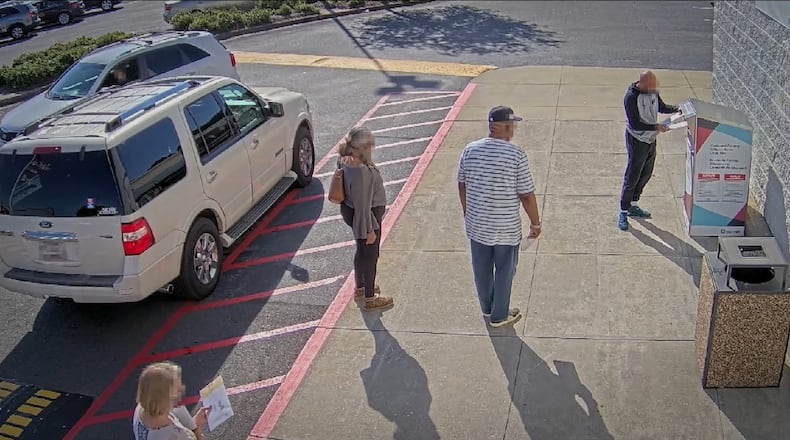A man falsely accused of voting fraud in the conspiracy film “2000 Mules” tried to hold its producers responsible Friday, asking a federal judge to rule in his favor.
But the moviemakers, including conservative filmmaker Dinesh D’Souza and the election group True the Vote, said they couldn’t have defamed a man whose face was blurred and who wasn’t identified by name.
U.S. District Judge Steven Grimberg didn’t signal how he would rule, asking skeptical questions of both sides before deciding whether to send the case to a jury or dismiss it.
“This case is not that complicated. It’s about defendants working together to spread a lie,” said Lea Haber Kuck, an attorney for Mark Andrews, an auditor from Gwinnett County who brought the suit. “They accuse him of committing a crime ... and expose him to ridicule, hatred and contempt.”
The lawsuit centers on an eight-second surveillance video featured in “2000 Mules” that shows Andrews returning absentee ballots for himself and four family members at a drop box before the 2020 election.
D’Souza, speaking as the narrator, tells the audience “What you are seeing is a crime. These are fraudulent votes.”
Credit: John Marshall Mantel
Credit: John Marshall Mantel
State election investigators cleared Andrews, and D’Souza later apologized, saying the film was based on “inaccurate information.” Dropping off ballots for family members is legal in Georgia.
Attorneys for D’Souza and True the Vote blamed each other in court. D’Souza’s lawyer said True the Vote’s research misled him into believing that Andrews was a “ballot mule,” and True the Vote said it can’t be held responsible for D’Souza’s words in his movie.
“There’s absolutely no evidence of malice or ill-will or evil intent,” said Amanda Hyland, an attorney for D’Souza. “We’re talking about matters of public importance.”
Jake Evans, representing True the Vote, said Andrews’ reputation wasn’t harmed because no one knew who he was until his name was revealed as part of the state investigation that exonerated him.
D’Souza was the one who highlighted Andrews in the film, as well as in marketing for the film such as a Times Square billboard and social media, Evans said. True the Vote provided the video of Andrews dropping off the ballots.
“If anyone should be liable, it’s him, not us,” Evans said. “You can’t have an objective to defame a person you do not know exists.”
True the Vote conducted as an analysis of cellphone location signals near drop boxes, though it was later disclosed in court documents that the cellphone signals didn’t match the video clips shown in the movie.
State investigations determined there wasn’t evidence to back up the film’s allegations of widespread fraud in the 2020 presidential election in which Democrat Joe Biden narrowly defeated Republican Donald Trump.
The accusations in “2000 Mules” are among numerous high-profile claims that were initially hailed as proof of wrongdoing in the 2020 election but did not hold up under scrutiny.
Grimberg, an appointee of President Donald Trump, asked pointed questions of each side.
Grimberg seemed to express doubt that the film targeted Andrews. He previously rejected an effort to dismiss the lawsuit.
“They were basically using him as a prop, a blurred vision of him, for the story they were trying to tell,” he said.
He also asked whether D’Souza should have continued promoting his film and book after the State Election Board dismissed the case against Andrews.
“You had the investigation clearing Mr. Andrews’ name, and you can’t stick your head in the sand,” Grimberg said.
If Grimberg rules the case should move forward, it could go to trial sometime between October and next June, he said.
About the Author
Keep Reading
The Latest
Featured






